
The Democratic Progressive Party (DPP) is a centre to centre-left Taiwanese nationalist political party in Taiwan. It is currently the major ruling party in Taiwan, controlling both the presidency and the central government, also the dominant party in the Pan-Green Coalition.
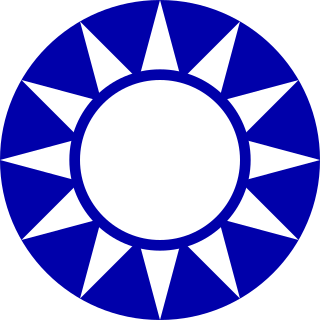
The Kuomintang (KMT), also referred to as the Guomindang (GMD), the Nationalist Party of China (NPC) or the Chinese Nationalist Party (CNP), is a major political party in the Republic of China, initially based on the Chinese mainland and then in Taiwan since 1949. The KMT is a centre-right to right-wing party and the largest in the Pan-Blue Coalition. Its primary rival is the Democratic Progressive Party (DPP) and its allies in the Pan-Green Coalition. As of 2024, the KMT is the largest single party in the Legislative Yuan. The current chairman is Eric Chu.

Taiwan, officially the Republic of China (ROC), is governed in a framework of a representative democratic republic under a five-power system first envisioned by Sun Yat-sen in 1906, whereby under the constitutional amendments, the President is head of state and the Premier is head of government, and of a multi-party system. Executive power is exercised by the Executive Yuan. Legislative power is vested primarily in the Legislative Yuan. Taiwan's judiciary is independent of the executive and the legislature. In addition, the Examination Yuan is in charge of validating the qualification of civil servants, and the Control Yuan inspects, reviews, and audits the policies and operations of the government.
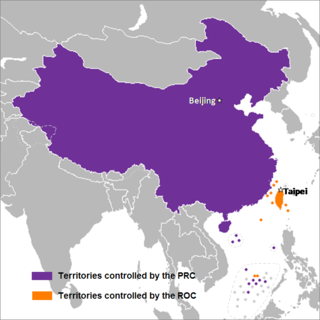
Chinese unification, also known as Cross-Strait unification or Chinese reunification, is the potential unification of territories currently controlled, or claimed, by the People's Republic of China and the Republic of China ("Taiwan") under one political entity, possibly the formation of a political union between the two republics. Together with full Taiwan independence, unification is one of the main proposals to address questions on the political status of Taiwan, which is a central focus of Cross-Strait relations.

The People First Party is a centrist or centre-right political party in Taiwan.
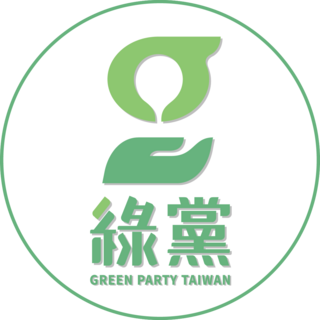
Green Party Taiwan is a political party in Taiwan established on 25 January 1996. Although the party is sympathetic to Taiwanese nationalism and shares a number of centre-left positions with the Pan-Green Coalition, the party emphasizes campaigning primarily on social and environmental issues. The party is not a member of, and should not be confused with, the Pan-Green Coalition. Green Party Taiwan is a member of the Asia Pacific Greens Federation and participates in the Global Greens.

Ma Ying-jeou is a Taiwanese politician who served as the 6th president of the Republic of China from 2008 to 2016. Previously, he served as the 14th justice minister from 1993 to 1996 and mayor of Taipei from 1998 to 2006. He served as chairman of the Kuomintang (KMT) from 2005 to 2007 and from 2009 to 2014.
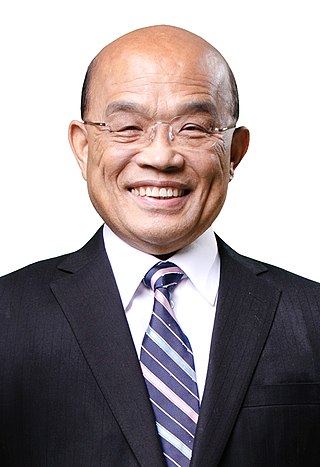
Su Tseng-chang is a Taiwanese politician who served as premier of the Republic of China (Taiwan) from 2006 to 2007 and again from 2019 to 2023. He was the chairman of the Democratic Progressive Party in 2005 and from 2012 to 2014. Su served as Chief of Staff to President Chen Shui-bian in 2004. He is currently the longest-serving Democratic Progressive premier in history.

You Si-kun, also romanized Yu Shyi-kun, is a Taiwanese politician. He was one of the founding members of the Democratic Progressive Party (DPP), and is known to be a strong advocate of Taiwan independence. He led the DPP as chairman from 2006 to 2007 and served as Premier from 2002 to 2005.

The Taiwan Affairs Office is an administrative agency under the State Council of the People's Republic of China (PRC). It is responsible for Cross-Strait relations and sets and implements guidelines and policies related to the Republic of China (Taiwan). Under the "one institution with two names" arrangement, it is equivalent to the Chinese Communist Party's Taiwan Work Office under the CCP Central Committee; the party title is used for party-to-party interactions with Taiwan.

Tsai Ing-wen is a Taiwanese politician who served as the 7th president of the Republic of China (Taiwan) from 2016 to 2024, and was the first woman to hold that position. A member of the Democratic Progressive Party (DPP), she intermittently served as chair of the DPP from 2008 to 2012, 2014 to 2018, and 2020 to 2022.

Steve Chen is a Taiwanese-American Internet entrepreneur who is one of the co-founders and previous chief technology officer of the video-sharing website YouTube. After he co-founded the company AVOS Systems, Inc. and built the video-sharing app MixBit, he joined Google Ventures in 2014.

Two referendums on United Nations membership applications were held in Taiwan on 22 March 2008, the same day as the presidential elections.

Presidential elections were held in Taiwan on 14 January 2012. The election was held concurrently with legislative elections. It was the fifth direct election for the President of the Republic of China. Prior to 1996, the President was elected by the ROC's National Assembly and not directly by the people.

Wu Den-yih is a Taiwanese politician. He graduated from National Taiwan University and worked as a journalist before beginning a career in politics with a 1973 appointment to the Taipei City Council. Wu was then elected Magistrate of Nantou County, serving from 1981 to 1989. Following two terms as magistrate, he was named Mayor of Kaohsiung in 1990. Wu remained mayor until 1998, having won the office in a 1994 direct election. He then served two full terms in the Legislative Yuan from 2002 to 2008. Shortly after winning a third term in the legislature, Wu was named Premier of the Republic of China in 2009. He served until 2012, when he and Ma Ying-jeou formed the Kuomintang (KMT) presidential ticket. Wu served one four-year term as Vice President of the Republic of China, stepping down in 2016. In May 2017, he was elected party chairman. Wu stepped down from the position in January 2020. Previously, Wu had served the KMT as secretary-general from 2007 to 2009, first vice chairman in 2014, and as acting chairman in 2014 and 2015.
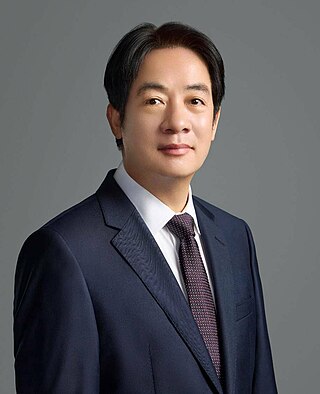
Lai Ching-te, also known as William Lai, is a Taiwanese politician and former physician who is currently serving as the 8th president of the Republic of China since May 2024. He is the third member from the Democratic Progressive Party (DPP) to assume the office of president. He is also the third incumbent vice president to succeed to the presidency, and the first of which to assume the office through election instead of immediate succession. He has also served as the chair of the DPP since 2023.

The status of women in Taiwan has been based on and affected by the traditional patriarchal views and social structure within Taiwanese society, which put women in a subordinate position to men, although the legal status of Taiwanese women has improved in recent years, particularly during the past two decades when the family law underwent several amendments.

Chang San-cheng is a Taiwanese politician who has been the mayor of Taoyuan City since 25 December 2022. He was premier of Taiwan from 1 February 2016 until 20 May 2016, appointed by President Ma Ying-jeou. Before assuming the premiership, he had served as vice premier from 8 December 2014 under the Mao Chi-kuo cabinet. Chang was the first nonpartisan premier of Taiwan.
Events from the year 2005 in Taiwan, Republic of China. This year is numbered Minguo 94 according to the official Republic of China calendar.
Taishang are Taiwanese businesspeople who do business in mainland China. The term literally translates into English as "Taiwan Business." There are no official statistics on the number of Taishang working in mainland China. Unofficial estimates circulating in 2011 suggested that between 1 million and 3 million Taiwanese nationals lived in mainland China.
















